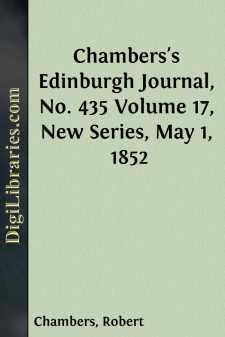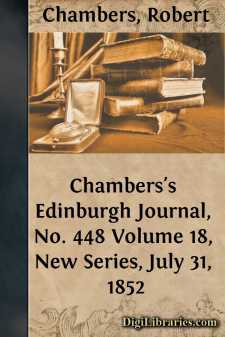Categories
- Antiques & Collectibles 13
- Architecture 36
- Art 48
- Bibles 22
- Biography & Autobiography 813
- Body, Mind & Spirit 142
- Business & Economics 28
- Children's Books 17
- Children's Fiction 14
- Computers 4
- Cooking 94
- Crafts & Hobbies 4
- Drama 346
- Education 46
- Family & Relationships 57
- Fiction 11829
- Games 19
- Gardening 17
- Health & Fitness 34
- History 1377
- House & Home 1
- Humor 147
- Juvenile Fiction 1873
- Juvenile Nonfiction 202
- Language Arts & Disciplines 88
- Law 16
- Literary Collections 686
- Literary Criticism 179
- Mathematics 13
- Medical 41
- Music 40
- Nature 179
- Non-Classifiable 1768
- Performing Arts 7
- Periodicals 1453
- Philosophy 64
- Photography 2
- Poetry 896
- Political Science 203
- Psychology 42
- Reference 154
- Religion 513
- Science 126
- Self-Help 84
- Social Science 81
- Sports & Recreation 34
- Study Aids 3
- Technology & Engineering 59
- Transportation 23
- Travel 463
- True Crime 29
Chambers's Edinburgh Journal, No. 429 Volume 17, New Series, March 20, 1852
by: Robert Chambers
Description:
Excerpt
THINGS IN EXPECTATION.
The passing age is acknowledged to be remarkable in various respects. Great advances in matters of practical science; a vast development of individual enterprise, and general prosperity;—at the same time, strange retardations in things of social concern; a singular want of earnestness in carrying out objects of undeniable utility. Much grandeur, but also much meanness of conception; much wealth, but also much poverty. A struggle between greatness and littleness; intelligence and ignorance; light and darkness. Sometimes we feel as if going forward, sometimes as if backward. One day, we seem as if about to start a hundred years in advance; on the next, all is wrong somewhere, and we feel as if hurriedly retreating to the eighteenth century!
Upon the whole, however, we are ourselves inclined to look at the bright side of affairs; and in doing so, we are not without hope of being able to make some proselytes. Let us just see what are the prospects of the next twenty years—a long enough space for a man to look forward to in anything else than a dream. War, it is true, may intervene, or some other terrible catastrophe; but we shall not admit this into our hypothesis, which proceeds on the assumption, that although people may wrangle here and there, and here and there fly at each other's throats, still the bulk of civilised mankind will go on tranquilly enough to present no direct barrier to the advancing tide. Here is a list of a few trifles in expectation.
A line of communication by railway from England to the principal cities in India, interrupted only by narrow sea-channels, and these bridged by steamboats. It will then be possible to travel from London to Calcutta in a week.
At the same time, there will be railways to other parts of Asia—Ispahan, Bagdad, Damascus, and Jerusalem. From the last-mentioned city, a line will probably proceed through the land of Edom, to Suez and Cairo; thence to Alexandria. This last portion is already in hand. Think of a railway station in the Valley of Jehoshaphat! As the course of the Jordan presents few 'engineering difficulties,' there might be a single line all the way from Nazareth to the Dead Sea, on which a steamer might take passengers to the neighbourhood of Petra. At a point near the shore of that mysterious sheet of water, a late traveller indicates the spot where Lot's wife was transformed into a pillar of salt. How interesting it would be to make this a stopping-place for tourists to view the adjacent scenery—rocky, wild, and scorched, as if fresh from the wondrous work of devastation!
It cannot be doubted that in a period much short of twenty years, railways will have penetrated from Berlin northwards to Russia; and therefore a communication of this kind through the whole of Europe, even to the shores of the Indian Ocean, will be among the ordinary things of the day.
As for communication by electric telegraph, where will it not be? Every town of any importance, from Moscow to Madras, will be connected by the marvellous wires....












